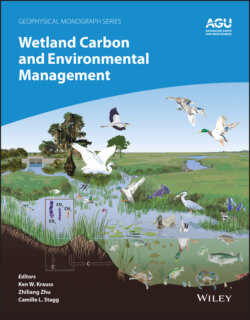Читать книгу Wetland Carbon and Environmental Management - Группа авторов - Страница 55
Decomposer communities.
ОглавлениеThe redox environment affects the community of bacterial and fungal decomposers, with fungal activity being greatly reduced under anaerobic conditions. Because fungi are capable of degrading poorly reactive molecules such as lignin and cellulose (Thormann, 2006), the suppression of fungal activity in anaerobic soils likely enhances carbon preservation. Fungi are often more important than bacteria in the initial decomposition of litter from wetland and riparian plants (Hieber & Gessner, 2002; Kuehn et al., 2000; Verma et al., 2003). Fungal abundances decline with depth from surface litter layers to wetland soil horizons, reflecting the lower O2 availability in the soil (Ipsilantis & Sylvia, 2007). Fungal abundances in bulk anaerobic soil can be orders of magnitude lower than those of bacteria and archaea (Dang et al., 2019). Given their redox sensitivity, it is perhaps not surprising that fungal community composition, extracellular enzyme activities, and soil respiration rates respond to water level changes (Jassey et al., 2018). However, fungi may be able to transport O2 into anaerobic soils, facilitating their own aerobic metabolism (Padgett & Celio, 1990), and obligately anaerobic fungi have been found in the deep biosphere and the guts of ruminants (H. Drake & Ivarsson, 2018 and references therein), raising questions about the true role of fungi as decomposers in anaerobic wetland soils.
